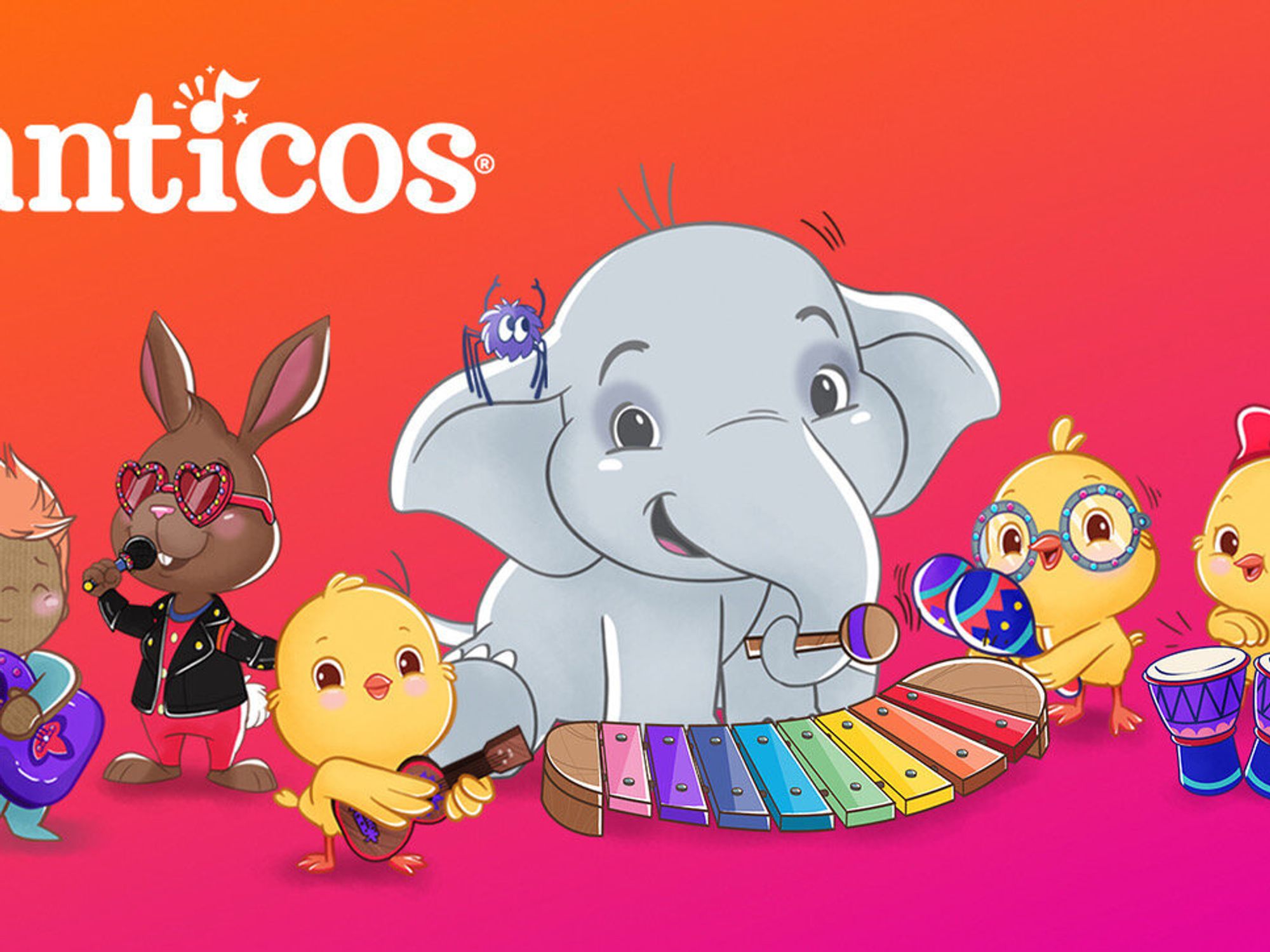Encantos' Plans for a More Diverse Future of EdTech
Sam primarily covers entertainment and media for dot.LA. Previously he was Marjorie Deane Fellow at The Economist, where he wrote for the business and finance sections of the print edition. He has also worked at the XPRIZE Foundation, U.S. Government Accountability Office, KCRW, and MLB Advanced Media (now Disney Streaming Services). He holds an MBA from UCLA Anderson, an MPP from UCLA Luskin and a BA in History from University of Michigan. Email him at samblake@dot.LA and find him on Twitter @hisamblake

When Noramay Cadena opened the bilingual children's books she had been gifted after she gave birth to her son last year, she was quickly taken back to her own childhood in Mexico. The book featured a Spanish-language lullaby, "The Pin Pon Song", about a cute cardboard doll, which Cadena described as both extremely silly and culturally significant.
"That's when I knew this was content that was by the community, for the community," she said. "As a user, I was really blown away by how they combined entertainment with education." She also thought the quality of the books was far higher than what she'd expect from what was then an early-stage startup based in L.A.
That would be Encantos, a publishing firm-turned-content house set on becoming the next big thing in edtech.
In addition to being a mother, Cadena is also an investor. In 2015, she co-founded L.A.-based MiLA Capital, a seed-stage firm "that invests in tech you can touch." Smitten by the Encantos product, she was disappointed that the company didn't align with her fund's focus on tangible products. But earlier this month, after Encantos decided to extend its seed round, another fund Cadena helps lead – Portfolia – was able to get in on the action through its Raising America Fund, which is devoted to people of color and LGBTQ founders, along with companies that serve those populations.
Encantos, which raised over $2 million in February to expand its brands and product mix, recently launched its subscription app, which chief executive Steven Wolfe Pereira told dot.LA will lead the company's shift toward a "direct-to-learner" platform. Encantos extended that seed round to take advantage of the increased demand for edtech that's combined with kids and family entertainment, Wolfe Pereira said. He added that the company is at 120% of its fundraising goal and still waiting for a few investors to confirm their check amounts before the round closes in September.
"We believe we're building the most important, impactful and beloved entertainment edtech company on the planet," he said.
Cadena is bullish as well. "I see this brand becoming a billion-dollar business," she said.
Encantos' leaders and investors point to three factors they think will help it get there.
The Right Recipe of Entertainment, Education and Technology
"We start with character and story," said Encantos Chief Creative Officer Susie Jaramillo, who co-founded the company with Wolfe Pereira after becoming a mom and quickly recognizing the dearth of Latinx-oriented children's content. She took two years off "to literally just draw," and designed Encantos' flagship brand: Canticos, about three little chickens. Those pollitas – which stem from another beloved Spanish-lanugage lullaby – evolved from a children's board book to Emmy-nominated Nick Jr. television show.
"If you don't have a strong character and a strong story, you have nothing," she said. The growth of Canticos established the playbook for Encantos to build out its other brands.
The educational component follows the story, Jaramillo said. Her colleagues in charge of the learning design look at the story and characters. They then decide what skills it lends itself to, and strategize how to incorporate those skills and stories into lessons across the company's products.
"It's not a counting story every time," Jaramillo said. "It's problem-solving, creative thinking, skills that will help you in the workplace. We make sure we're checking the box on (a range of) character traits (across our suite of stories and products)."
Then comes the tech, namely in the form of the recently launched subscription app, which Wolfe Pereira said has over 200,000 subscribers so far. The hope is that as kids engage with the app and the various stories and characters over time, the company will be able to develop a "learning graph" personalized for each user.
"If we do this right, we can take the wonderful data visualization that exists in enterprise or consumer products like the Apple Watch and understand each kid's learning journey over time," Wolfe Pereira said.

A Range of Physical and Digital Products
Along with shows like "Canticos", Encantos offers a variety of physical products including books, toys and games, in addition to its subscription app. This diversity of products is key to its strategy: according to a company pitch deck shared with dot.LA, the digital products are meant to drive revenue, while the books and other physical products build loyalty.
Marlon Nichols, partner at L.A.-based MaC Venture Capital, which has invested in Encantos, likes how "they have a number of monetization schemes and strategies and models that all center around a theme of creating high-quality children's content."
Cadena also points to the range of ages that the company can serve as a big draw, from both a user's and investor's perspective. Encantos is aiming to design products for kids aged 0-2, 3-5, 6-8 and 9-12.
"There's no single company that owns a portfolio of products that appeal to kids throughout all these phases of childhood," Portfolia wrote in its press release about the recent investment.
Building on Cultural and Demographic Trends
Wolfe Pereira says the growing generation of millennial parents want more culturally relevant, useful education for their kids. He looks at the fact that Latinx characters appear in about 5% of childrens' books even though Latinx youth comprise over 25% of the U.S. population under 16 – and how their parents' purchasing power is growing. Wolfe Pereira also sees the pandemic driving up homeschooling, remote learning and video streaming, as well as the value of animated content — which is safer for studios to produce in a pandemic. These trends lead him to conclude that "we check all the boxes in an interesting way."
Jaramillo pointed to the growth of the Black Lives Matter movement as further evidence that the demand for new, diverse characters is here to stay.
Encantos' next brand, Issa, is slated to launch on "a major streamer," probably in late 2021, according to Aliya LeeKong, who created the character whose magic cookbooks help her to travel the world to share food and culture with new friends. LeeKong said Issa was inspired by a realization she had, when she had her own daughter, that there were few places for children to learn about food and nutrition, and even fewer children's characters who looked like her kid.
Encantos' diversity permeates its leaders and investors. As a public benefit corporation, it is beholden to stakeholder value, not just shareholders. Cadena says this authentic incorporation of diverse perspectives at the highest level enables content and products that other, less diverse funders and executives might overlook – like her old lullaby buddy, the cardboard doll who goes by the name of Pin Pon.
- Bilingual Publisher Encantos Raises $2 Million - dot.LA ›
- OK Play Says It's a Kids App Parents Won't Feel Guilty About - dot.LA ›
- TutorMe Parters with Comcast — and Over 100 Other Companies - dot.LA ›
- TutorMe Parters with Comcast — and Over 100 Other Companies - dot.LA ›
- TutorMe Parters with Comcast — and Over 100 Other Companies - dot.LA ›
- Quizizz Edtech Startup Is Expanding in Santa Monica - dot.LA ›
- Emile Creates 'TikTok' Style Videos to Help You Prep For Your AP Test - dot.LA ›
- Encantos' Bilingual Edtech App Will Rely On Educator-Authors - dot.LA ›
- Formative Edtech Raises $70M Series A Round - dot.LA ›
- Encantos Snags Former Girl Scouts of America CEO - dot.LA ›
- Encantos Founder Steven Wolfe Pereira on His Multicultural Teaching and Publishing Platform - dot.LA ›
Sam primarily covers entertainment and media for dot.LA. Previously he was Marjorie Deane Fellow at The Economist, where he wrote for the business and finance sections of the print edition. He has also worked at the XPRIZE Foundation, U.S. Government Accountability Office, KCRW, and MLB Advanced Media (now Disney Streaming Services). He holds an MBA from UCLA Anderson, an MPP from UCLA Luskin and a BA in History from University of Michigan. Email him at samblake@dot.LA and find him on Twitter @hisamblake






 Image Source: Skyryse
Image Source: Skyryse
 Image Source: Northwood Space
Image Source: Northwood Space